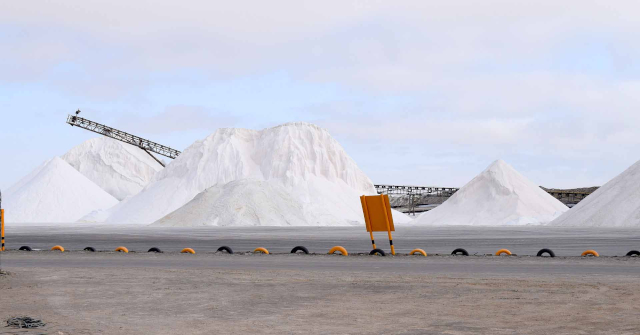We’ve been hearing for years, now, that too much salt is a clear and present danger to your heart. But the packaged and processed food industry hasn’t done much to reduce salt content in its products. Now, the FDA is issuing new, even-tighter recommendations for the use of salt…
 Mountains of Salt, literally: in the storage yard of a modern salt production facility..
Mountains of Salt, literally: in the storage yard of a modern salt production facility..
The U.S. Food and Drug Administration (FDA) used to consider 3,400 mg of salt per day for adults the absolute maximum it could condone. In fact, the Agency even stressed that the reasonable, healthy daily limit for salt was 2,300 mg. Trouble is, most Americans (and folks in other developed countries, too) still consume closer to the 3,400 mg ceiling or more every day. Some even more.
The worst contributor to this manifestly unhealthy practice is not, as you might think, the salt shaker on your table. It’s processed and packaged foods, which more and more folks have turned to over the pandemic era to make eating at home more convenient. Not to mention that many folks doomed to working and eating at home had never learned to cook anything more complex than Kraft Mac and Cheese and were in danger of starving if it were not for takeout and delivery – and packaged, prepared foods.
Studies of consumer habits over the worst 12 months of the pandemic show that the eating habits of many folks locked down in their homes deteriorated significantly, with salt, sugar and fat consumption – as well as Calories per day – increasing. Not to mention the general decline in physical activity that accompanied the increase in unhealthy eating.
“Sodium is widely present in the American diet (most commonly, but not exclusively, as a result of eating or drinking foods to which sodium chloride, commonly referred to as ‘salt’, has been added),” according to the FDA. “More than 70 percent of total sodium intake is from sodium added during food manufacturing and commercial food preparation.”
The new limits
“The targets in the final guidance seek to decrease average sodium intake from approximately 3,400 milligrams (mg) to 3,000 mg per day, about a 12 percent reduction, over the next 2.5 years.,” the official FDA news release states. “Although the average intake would still be above the Dietary Guidelines for Americans recommended limit of 2,300 mg per day for those 14 and older, we know that even these modest reductions made slowly over the next few years will substantially decrease diet-related diseases.”
Maybe.
The question is, will consumers get wise to the dangers of excess salt in their diets? And will the packaged and processed food industry comply? I predict the industry will make sympathetic noises and take token action to further reduce the salt contact of their products. But they won’t remove enough salt to meet the new limits, for fear that folks will find their products taste too bland and stop buying them. As usual, the industry emphasizes, “We don’t tell people what to buy or what to eat. It’s their choice.”
An end to voluntary limits?
So… No points to the FDA for simply reducing the voluntary limits on salt. But to listen to Agency spokespeople comment, one gets a definite feeling that the days of voluntary action may be coming to an end.
“The FDA is issuing a final guidance, ‘Voluntary Sodium Reduction Goals: Target Mean and Upper Bound Concentrations for Sodium in Commercially Processed, Packaged, and Prepared Foods,’ which provides voluntary short-term sodium reduction targets for food manufacturers, chain restaurants and foodservice operators for 163 categories of processed, packaged and prepared foods,” the agency announced in its statement. Note, especially, the word ‘final’.
“The pandemic has graphically illustrated why today’s announcement is so important and why it’s so important that we take care of our health,” U.S. Health and Human Services (HHS) Secretary Xavier Becerra said, adding the consequences of Americans’ sky-high sodium intake could be, “catastrophic personally and for the country.”
What next?
With the HHS calling the salt situation a potential ‘catastrophe’, there’s little doubt in my mind that more-drastic, and compulsory action is being cued up in the wings. The U.S. government is giving the industry one last warning before imposing mandated limits on the food manufacturing and restaurant industries.
And I have to say I agree with the government: Imagine how much society could save on health care costs if the new, dramatically lower limits on added salt were actually followed. And a special note for Americans: How much could you save on health insurance costs if the insurance companies no longer had to bank billions in cash against claims for heart disease and stroke treatment?
Anyway… Only time will tell whether the restaurant and packaged/processed food industries reduce salt voluntarily and come out looking like corporate citizenship heroes, or gird against further salt reductions and risk mandatory regulation…
~ Maggie J.

